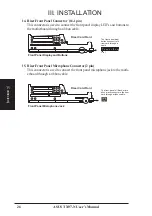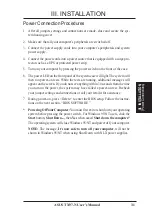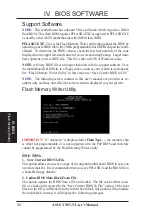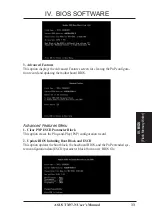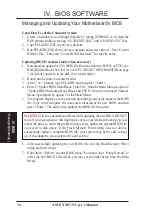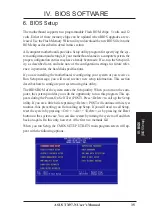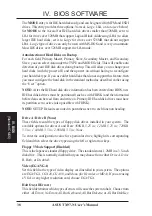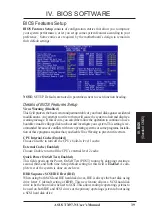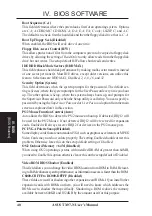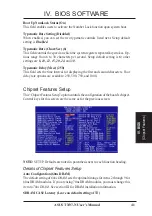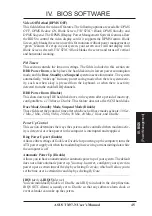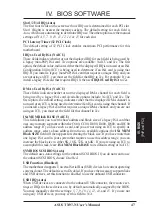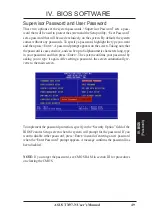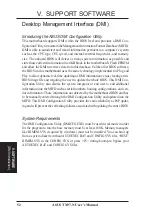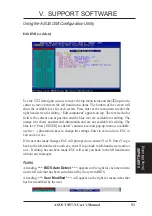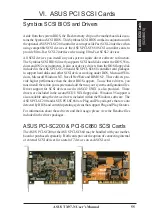
ASUS TX97-N User’s Manual
40
IV. BIOS SOFTWARE
IV
. BIOS
(BIOS Features)
Boot Sequence (C,A)
This field determines where the system looks first for an operating system. Options
are C,A; A,CDROM,C; CDROM,C,A; D,A; E,A; F,A; C only; LS/ZIP, C; and A,C.
The default is to check first the hard disk and then the floppy disk drive, that is, C, A.
Boot Up Floppy Seek (Disabled)
When enabled, the BIOS will seek drive A one time.
Floppy Disk Access Control (R/W)
This allows protection of files from the computer system to be copied to floppy disk
drives by allowing the setting of Read Only to only allow reads from the floppy disk
drive but not writes. The setup default R/W allows both reads and writes.
IDE HDD Block Mode Sectors (HDD MAX)
This field enhances hard disk performance by making multi-sector transfers instead
of one sector per transfer. Most IDE drives, except older versions, can utilize this
feature. Selections are HDD MAX, Disabled, 2, 4, 8, 16, and 32.
Security Option (System)
This field determines when the system prompts for the password. The default set-
ting is System, where the system prompts for the User Password every time you boot
up. The other option is Setup, where the system always boots up, and prompts for
the Supervisor Password only when the Setup utility is called up. You can specify a
password by using the Supervisor Password or User Password option from the main
screen as explained later in this section.
PS/2 Mouse Function Control (Auto)
Auto allows the BIOS to detect the PS/2 mouse on bootup. If detected, IRQ12 will
be used for the PS/2 Mouse. If not detected, IRQ12 will be reserved for expansion
cards. Enabled will always reserve IRQ12 for devices on the PS/2 mouse port.
PCI/VGA Palette Snoop (Disabled)
Some display cards that are nonstandard VGA such as graphics accelerators or MPEG
Video Cards may not show colors properly. The setting Enabled should correct this
problem. Otherwise leave this on the setup default setting of Disabled.
OS/2 Onboard Memory > 64M (Disabled)
When using OS/2 operating systems with installed DRAM of greater than 64MB,
you need to Enable this option otherwise leave this on the setup default of Disabled.
......................................................................................................................................
Video ROM BIOS Shadow (Enabled)
This field allows you to change the video BIOS location from ROM to RAM. Relocat-
ing to RAM enhances system performance, as information access is faster than the ROM.
C8000-CBFFF to DC000-DFFFF (Disabled)
These fields are used for shadowing other expansion card ROMs. If you install other
expansion cards with ROMs on them, you will need to know which addresses the
ROMs use to shadow them specifically. Shadowing a ROM reduces the memory
available between 640KB and 1024KB by the amount used for this purpose.

